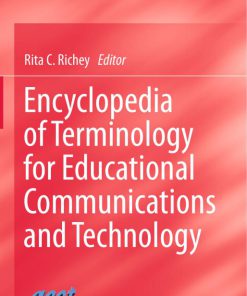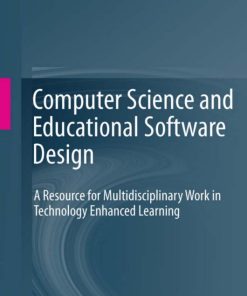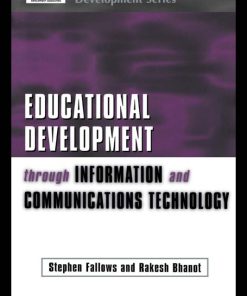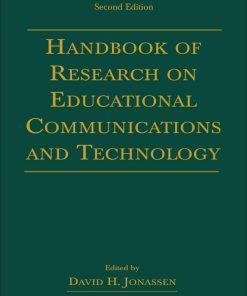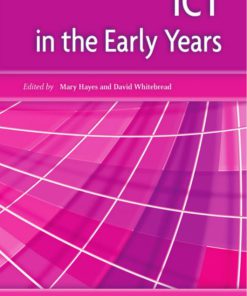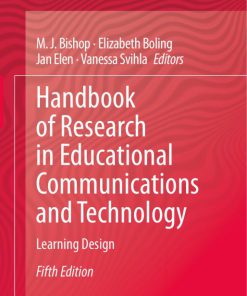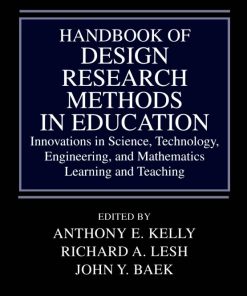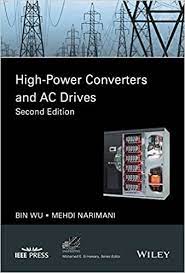(Ebook PDF) Technology Enhanced Learning Quality of Teaching and Educational Reform Communications in Computer and Information Science 73 1st edition by Miltiadis D. Lytras, ‎Patricia Ordonez De Pablos, ‎David Avison 3642131662 9783642131660 full chapters
$50.00 Original price was: $50.00.$25.00Current price is: $25.00.
Authors:Miltiadis D. Lytras, Patricia Ordonez De Pablos, David Avison, Janice Sipior, Qun Jin, Walter Leal, Lorna Uden, Michael Thomas, Sara Cervai, David G. Horner , Series:Education [265] , Tags:Springer , Author sort:Miltiadis D. Lytras, Patricia Ordonez De Pablos, David Avison, Janice Sipior, Qun Jin, Walter Leal, Lorna Uden, Michael Thomas, Sara Cervai, David G. Horner , Ids:3642131654 , Languages:Languages:eng , Published:Published:Jun 2010 , Publisher:Springer , Comments:Comments:Springer
Technology Enhanced Learning: Quality of Teaching and Educational Reform (Communications in Computer and Information Science, 73) 1st edition by Miltiadis D. Lytras, Patricia Ordonez De Pablos, David Avison – Ebook PDF Instant Download/DeliveryISBN: 3642131662, 9783642131660
Full download Technology Enhanced Learning: Quality of Teaching and Educational Reform (Communications in Computer and Information Science, 73) 1st edition after payment.
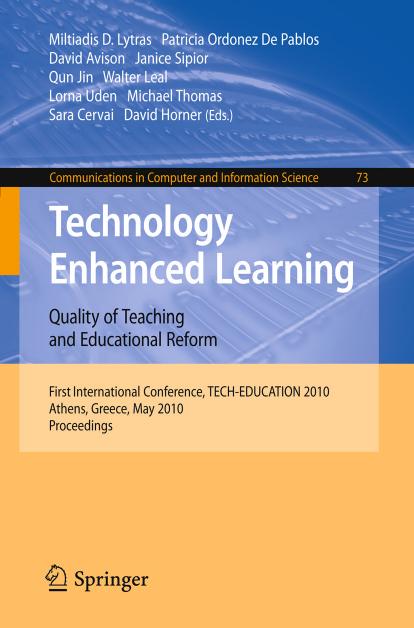
Product details:
ISBN-10 : 3642131662
ISBN-13 : 9783642131660
Author : Miltiadis D. Lytras, Patricia Ordonez De Pablos, David Avison
It is a great pleasure to share with you the Springer CCIS proceedings of the First International Conference on Reforming Education, Quality of Teaching and Technology-Enhanced Learning: Learning Technologies, Quality of Education, Educational Systems, Evaluation, Pedagogies––TECH-EDUCATION 2010, Which was a part of the World Summit on the Knowledge Society Conference Series. TECH-EDUCATION 2010 was a bold effort aiming to foster a debate on the global need in our times to invest in education.
Technology Enhanced Learning: Quality of Teaching and Educational Reform (Communications in Computer and Information Science, 73) 1st Table of contents:
Moodle 2.0: Shifting from a Learning Toolkit to a Open Learning Platform
A Bit of Moodle’s History, Aims and Philosophy
Moodle’s Philosophy
Moodle’s Success
Moodle Evolution: Stability versus Innovation
The New Wiki of the Emperor
Moodle’s Focus on Reliance, Freeze Features
Opening Up the Walled Garden of the LMS
Online Learning Outside the LMS?
The Upcoming Moodle: Moodle 2.0
IMS LTI a Interoperability Standard Designed to Mash Up Online Tools for Learning Purposes
The Way in: How to Make Moodle More Receptive to External Tools?
Way Out. From Moodle to the Outside World
Conclusions and Further Work
References
Technology Enhanced Learning for People with Intellectual Disabilities and Cerebral Paralysis: The M
Introduction
Background
MAS: Technology Enhanced Learning for Children with Severe Intellectual Disabilities and Cerebral Pa
Overview Architecture
Implementation Issues
Games
Conclusions and Future Work
References
Student Blogging: Implications for Learning in a Virtual Text-Based Environment
Introduction
Methodology
Findings
Discussion
Conclusions
References
Confidence-Based Learning in Investment Analysis
Introduction
Definition and Assessment of Knowledge
Research Design
Data and Analysis
Analysis of the Degree of Confidence in the Answers in the Two Periods
Analysis of Levels of Difficulty
Analysis of the Time Differences between the Two Periods
Summary and Conclusions
References
Language Teaching across the Digital Divide
Introduction: Language Attrition and the Power Struggle
Computer Assisted Language Learning: A Brief History
Language Education and Social Justice
The Internet and Social Justice
Online Language Learning and Social Justice
Conclusion
References
EduSynergy: A Simulation-Based Change Management Experience for Higher Education Institutions
Introduction
Value of Simulation-Based Change Management Experiences
Overview of the Simulation’s Dynamics
Simulation Adaptation
Validation
Conclusions
References
The Study of Educative Network Organizations in the City of Barcelona, Spain: The Nou Barris Distric
Introduction
Methodology and Proceedings
Results
Conclusions and Research Outlets
References
Experimenting Design and Implementation of an Educational Services Management System Based on ISO/IE
Education Providers Are Encouraged to Implement Quality Management; The Existing Standards and Frame
ISO/IEC 20000 Is a Management System Standard Addressing IT Services, Widening Its Scope to “non I
Applying ISO/IEC 20000 to Educational Services Requires a First Step of Guidance Formalization
ISO/IEC 20000 Standard Is Compliant with European Standard Guidelines and May Provide Useful Guidanc
References
Having Your Own Automatic Judge: EEWS
Introduction
Software Requirements
Downloading and Preparing the Source Code
Compiling
Initial Configuration
References
Mii School: New 3D Technologies Applied in Education to Detect Drug Abuses and Bullying in Adolescen
Introduction: Virtual Reality in Education
Scenes Description of Mii School
Mii School Development Methodology
3D Design
Texturing/Illumination
Animation
Python Programming
Blender Game Engine
Satisfaction Results
Future Works
References
KP-Lab System: A Collaborative Environment for Design, Realization and Examination of Different Know
Introduction
State of the Art
KP-Lab System
KP-Lab Platform
KP-Environment
Analytical Tools
Conclusion
References
Machine Learning Support for Human Articulation of Concepts from Examples – A Learning Framework
Introduction: Research Motivation
Machine Learning Supporting the Human Learn from Examples
The HMCD Learning Framework
Research Hypotheses
Evaluation Methodology
Summary and Future Work
References
Oratoria Online: The Use of Technology Enhaced Learning to Improve Students’ Oral Skills
Introduction
Online Oratory vs. (Traditional) Speech Techniques
Online Oratory Step by Step
Conclusions
References
Legibility for Users with Visual Disabilities
Introduction
Structure and Description
Methodology
Results and Discussions
Conclusion
References
Assessment of Andragogical Attributes of Distance Learners
Introduction
Statement of the Problem
Significance of Study
Research Method
Findings
Conclusion and Recommendation
References
Moodle 2.0 Web Services Layer and Its New Application Contexts
Introduction
Related Works
SOA Approach in Education
Moodle Web Services Layer
Backoffice Web Client
Main Reasons for This Development
Backoffice Tool Main Features
Other Funcionalities
Conclusions
References
Didactic Scenarios and ICT: A Good Practice Guide
Introduction
Conditions for Creating and Designing D.S.
Configuration of a D.S.
Starting a Scenario
Epistemological Approach – In the Context of a “School Epistemology”
Extensions
Predicting Difficulties
The Rationale of Using Digital Systems
Teaching “Noise”
Usage of Additional External Sources
Multiple Representations – Multiple Approaches
Underlying Learning Theories
Change in Lesson’s Organizing and in Concept’s Meaning
Didactic and Computational Transposition
Didactic Contract
Feasibility and Lesson Organizing
Instead of Conclusions
References
Interactive Whiteboard Integration in Classrooms: Active Teachers Understanding about Their Training
Introduction
Metodology
Results
Conclusion
References
Teaching Business Simulation Games: Comparing Achievements Frontal Teaching vs. eLearning
Introduction
“Business Management Simulation Game” Course
Research Rationale
Methodology
Main Research Findings
Conclusions
References
The VOLARE Methodology: Using Technology to Help Changing the Traditional Lecture Model
Introduction
The Methodology
Our Postulates
The VOLARE Methodology
Evidence of the Pedagogical Validity of Videolectures
Related Work
Discussion and Conclusions
References
Towards an Automatic Forum Summarization to Support Tutoring
Introduction
Interaction
Background of Summarization
Summarization System Architecture
Considerations
References
Efficiency Assessment of a Blended-Learning Educational Methodology in Engineering
Research Context
Experience on a Methodology Based on Active Learning Processes in Engineering Students
Objetives and Hypotheses
Research Design
Sample
Variables
Instruments
Results Advance
Conclusions
References
TELL(Technology-Enhanced Language Learning) and Less-Commonly Taught Languages: The Case of Modern G
Introduction
Considering LCTL in the TELL Context
TELL and Modern Greek: The “filoglossia+” Courseware
Target Group and Pedagogical Objectives
Structure and Components
Theoretical Underpinnings
Technologies and Tools
Conclusion
References
A Case Study of Modular-Based Project Oriented Learning in Electrical Engineering
Introduction
Learning Outcomes of DSP Module
Methodology
Components of the Project-Based Module
Project Assignment
Performance Evaluation
Questionnaire
Conclusion
References
Origami in Education Enhanced by Computer Technology: A Case Study of Teaching Hexaflexagon in Math
Introduction
The Process of the Classes
The First Class Period
The Second Class Period
Conclusions
References
Challenges of Implementing ESD in the Education Sector; Experiences in Norway
What Is Sustainable Development?
What Is Education for Sustainable Development?
Strategies and Instruments for Education for Sustainable Development
Collaboration
Disciplinary and Interdisciplinary Approaches
Information and Media
Further Innovation: SUPPORT and CO$_2$nnect
Summary
References
Using Automated Assessment Feedback to Enhance the Quality of Student Learning in Universities: A Ca
Introduction
Automated Student Feedback: A Case Study
Conclusions and Recommendations
References
Lessons Learned from Deploying a Video-Based Web 2.0 Platform in an Executive Education Context
Introduction
Learning Community Deployment Context
Deployment Design
Discussion of Evaluation Results
Conclusions
References
Improving the Scholarship of Teaching and Learning through Classroom Research
Introduction
The Scholarship of Teaching and Learning
Strengthen the Scholarship of Teaching and Learning through Classroom Research
Classroom Research about Student Questioning
Why Promoting Students’ Questions?
Strategies to Enhance Students’ Questioning
Enhancing the Scholarship of Teaching: A Summary
References
Which Are the Determinants of Online Students’ Efficiency in Higher Education?
Introduction
Theoretical Framework: ICT and Student Performance
Hypothesis and Methodology
Empirical Model and Data
Results and Discussion
References
On the Utility of ICT in the European Higher Education Area: The Bologna Process and Its Implication
Introduction
State of the Art
Discussion
Conclusions
References
Computer Programming: Fail Fast to Learn Sooner
Reasons for Failure
Constructivism in Education
Why Weekly Assessment
How Weekly Assessment
Our Method
Self Assessment
The Weekly Assessment
Implementation Resources
Our Outcomes with Weekly Assessment
References
Experiential Collaborative Learning and Preferential Thinking
Introduction
Theoretical Background
The PBL Approach
The Survey Design
Survey Results and Discussion
Conclusion
References
Computer Sciences Applied to Management at Open University of Catalonia: Development of Competences
Teamworks
Course Presentation and Objectives
Resources for Learning: The Case and the Collaborative Work Platform
Methodology
Conclusions
References
From Workshop to the Web: Reflections on the Journey in Producing Vidcasts to Enhance Student Learni
Introduction
Theoretical Background
Nature of Research Problem and Outline of the Methodology
Research Problems Identified in the Initial Stages of the Project
Results from Research in Progress
References
‘Virtual Learning-by-Doing’ Teamwork KSA: Strategic Management Simulation as an Effective Tool
Introduction
‘Virtual Learning-by-Doing’ Using Business Simulation
Methods: Course Design and Variables
Results
Discussion
References
The Digital Board in a University Setting: Two Real Cases in Europe and East Africa
Introduction
The Project
Training
Innovation
Conclusion
Future Work
E-Learning across Cultural Boundaries: A European Perspective on Technology Acceptance
Introduction
Acceptance Theories and the UTAUT
A European Perspective on the Acceptance and Use of Technology
Research Model and Hypotheses
Results, Conclusions and Future Work
References
Using Collaboration Strategies to Support the Monitoring of Online Collaborative Learning Activity
Introduction
Why Monitoring?
Critical Information
Monitoring CSCL
Conclusions and Future Work
References
Knowledge Construction with Social Web Tools
Introduction
Theoretical Framework
Research Context
Data Analysis
Results and Discussion
Conclusion
References
Information Security Threats Analysis for E-Learning
Introduction
Literature Review
Threat Analysis
Discussions
Conclusions
People also search for Technology Enhanced Learning: Quality of Teaching and Educational Reform (Communications in Computer and Information Science, 73) 1st:
what is technology enhanced learning
types of technology enhanced learning
technology enhanced learning and living
technology enhanced learning is usually a form of
technology enhances learning





